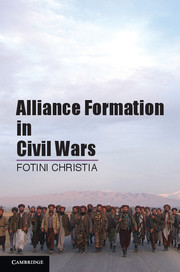Book contents
- Frontmatter
- Contents
- Figures
- Tables
- Maps
- Acknowledgments
- Introduction
- PART I CONTEXT AND THEORY
- 1 Literature and Research Design
- 2 A Theory of Warring Group Alliances and Fractionalization in Multiparty Civil Wars
- PART II AFGHANISTAN
- PART III BOSNIA AND HERZEGOVINA
- PART IV FURTHER EXTENSIONS
- Note on Sources
- Appendix
- References
- Index
2 - A Theory of Warring Group Alliances and Fractionalization in Multiparty Civil Wars
Published online by Cambridge University Press: 05 December 2012
- Frontmatter
- Contents
- Figures
- Tables
- Maps
- Acknowledgments
- Introduction
- PART I CONTEXT AND THEORY
- 1 Literature and Research Design
- 2 A Theory of Warring Group Alliances and Fractionalization in Multiparty Civil Wars
- PART II AFGHANISTAN
- PART III BOSNIA AND HERZEGOVINA
- PART IV FURTHER EXTENSIONS
- Note on Sources
- Appendix
- References
- Index
Summary
This book seeks to explain two phenomena. The first phenomenon is civil war alliances between warring groups – why they form and why they shift over the course of a conflict. I argue that civil war alliances are instrumental – they are formed by groups in order to (1) win the war and (2) maximize the group's share of postwar political control. Groups seek alliances that are powerful enough to secure victory but small enough to avoid having to share payoffs. Moreover, there is an inherent commitment problem within alliances: With no third-party enforcer, the strongest group cannot credibly commit that it will not turn on its weaker partner(s) and capture complete political control after the war's conclusion. Neither the past histories of alliances between groups nor the track records for trustworthiness of individual groups seem to have any meaningful effect on the intensity of this commitment problem – in an environment so characterized by anarchy, groups can be cheated by seemingly trustworthy partners, so long as the relative power conditions are right. The result of this commitment problem is that the weaker alliance partner, even when it appears to be on the winning side, will often prefer to defect to a balancing alliance and prolong the war if this gives them a chance to be a relatively stronger group within a winning alliance. These complex dynamics, exacerbated by the fog of war, make it very difficult for the multitude of warring parties to determine which side to be on. The result is a process of constant defection, alliance reconfiguration, and group fractionalization.
Meanwhile, identity – be it racially, linguistically, religiously, or ideologically defined – appears to have no sustained causal role in the formation of alliances. Rather, elite-constructed identity narratives that arise in justification of alliance choices are a mere product of tactical preferences. Identity matters in that it provides the building blocks from which warring groups are formed, but it does not drive alliance choices. Instead, elites of the warring parties pick allies whose support will result in optimizing their wartime returns, and then look to their identity repertoires for characteristics shared with their allies while not shared with their foes. The resulting identity narratives, while epiphenomenal to elite power considerations, serve as important signals to the rank and file, signals that resonate more strongly than unmasked references to relative power.
- Type
- Chapter
- Information
- Alliance Formation in Civil Wars , pp. 32 - 54Publisher: Cambridge University PressPrint publication year: 2012



